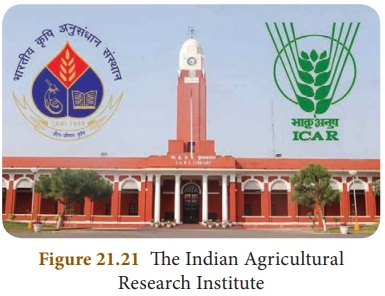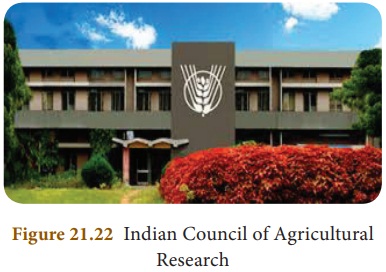Crop Production and Management | Chapter 21 | 8th Science - Agriculture Research Institutions | 8th Science : Chapter 21 : Crop Production and Management
Chapter: 8th Science : Chapter 21 : Crop Production and Management
Agriculture Research Institutions
Agriculture Research Institutions
Agricultural research institutions
formulate the agricultural practices based on recent research results and
farmers’ needs. Using suitable media and methods, they disseminate those
information for the welfare of the people. Indian Agricultural Research
Institute and Indian Council of Agricultural Research are some of the
institutions which are involved in agricultural research.
Indian Agricultural Research
Institute (IARI)
The Indian Agricultural Research
Institute is a national institute for agricultural research, education and
extension. IARI is commonly known as the Pusa Institute.

It is financed and administrated by
the ICAR (Indian Council of Agricultural Research). This was responsible for
research leading to the green revolution in India during 1970s. The policies,
plans and programs of IARI have helped to meet the needs of the nation. Several
popular high yielding varieties of major crops have been developed by IARI.
Indian Council of
Agricultural Research (ICAR)
The Indian Council of Agricultural
Research is an autonomous body responsible for co-ordinating agricultural
education and research in India. The union minister of agriculture serves as
its president. It functions under the Department of Agricultural Research and
Education, Ministry of Agriculture. It is the largest network of agricultural
research and education institutes in the world.

Krishi Vigyan Kendra
Krishi Vigyan Kendra is a farm
science centre. These centres serve as the ultimate link between ICAR (Indian
council of Agricultural research) and farmers. Their aim is to apply
agricultural research findings in practical localized settings. The first KVK
was established in 1974 at Pondicherry. Since then, KVKs have been established
in all states and the number continues to grow. KVKs are expected to undertake
their own projects. They are also expected to serve as a resource center for
extending government initiative to local areas.
KVKs can be formed under a variety
of host institutions, including agricultural universities, state departments,
ICAR institutes and other educational institutions or non government organisations.
a. Responsibilities of KVK
Each KVK operates a small farm to
test new technologies, such as seed varieties or innovative farming methods
developed by ICAR institutes. This allows new technologies to be tested at the
local level before being transferred to farmers. It also organizes programs to
show the efficacy of new technologies on farmer’s fields. KVKs organise
workshops to discuss modern farming techniques with groups of farmers. KVKs
provide advisory service to the farmers about weather and market pricing
through radio and mobile phones. It focuses on crops and cultivation methods.
It also facilitates rapport between the institution and the local community.
Activity 6
Visit a Krishi Vigyan
Kendra in your area with your teacher. Find out the activities carried out in
those centres.
Related Topics